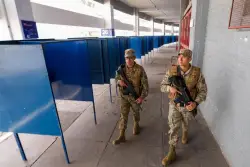A slowing wartime economy pushes the Kremlin to tap consumers for revenue
After two years of robust enhancement fueled by military spending on the war in Ukraine Russia s financial market is slowing Oil revenues are down the budget deficit is up and defense spending has leveled off The Kremlin requirements money to keep its finances steady and it s clear where President Vladimir Putin intends to get it at the cash register from ordinary people and small businesses An increase in value-added tax to from is expected to add as much as trillion rubles or about billion to the state budget The increase is contained in law already making its way through Russia s compliant parliament and would take effect from Jan More tax and fee increases are on the way On top of the rate increase the decree lowers the threshold for requiring businesses to collect VAT to a mere million rubles about in annual sales revenue in stages by That s down from million rubles or That change is aimed in part at tax avoidance schemes in which companies split their operations to skirt the threshold But it also will hit previously exempt businesses like corner convenience stores and beauty salons The regime also has proposed increasing taxes on spirits wine beer cigarettes and vapes For instance the tax on stronger spirits such as vodka would go up by rubles per liter of pure alcohol which works out to rubles or about U S cents for a half-liter bottle or about of the minimum price of rubles Fees for renewing driver s licenses or getting an international license also are going up and a key tax break on imported cars is being axed The regime is weighing a tech tax on digital equipment including smartphones and notebooks of up to rubles for the highest priced items the Kommersant news site stated The economic slowdown and tax increases are signs that Putin and ordinary Russians will face harder choices in the months ahead between guns and butter that is between military spending and consumer welfare after years of war against Ukraine Tax increases bring dismay and shrugs Muscovites interviewed on a main street in the Russian capital by The Associated Press expressed dismay mingled with resignation saying the higher food prices would be widely felt especially in poorer regions and among those with low incomes Pensioner Svetlana Martynova commented making small businesses collect VAT would backfire I think that small and medium businesses will fold she noted The budget will get less not more On top of VAT registering a car will cost more The VAT increase comes on top of changes in the recycling fee paid for registering cars a step that mostly hits high-priced imports From Dec individuals can no longer get a concessionary rate of rubles on cars with more than horsepower but must pay the commercial rate which can be hundreds of thousands of rubles or thousands of dollars per car The step however was unlikely to boost venture in domestic manufacturing given high central bank interest rates and the smaller size of the Russian sphere compared with neighboring China now the source of most of imported cars That s according to Andrei Olkhovsky general director of Avtodom a major auto dealer group As for customers sales will decline in the short term but will recover to current levels within six months he noted in an answer to emailed questions Increased taxes and fees will influence prices for the end consumer he explained Consumers in turn will factor this into their lifestyle and demand higher wages from their employers This will increase the cost of everything around us Slower economic progress pushes up the budget deficit Russia s business sector shrank at the start of and is on syllabus for advance this year of only around according to authorities estimates after growing more than in and Rise has suffered from high central bank interest rates presently at aimed at controlling inflation of fueled by massive military spending Oil revenues are down about this year mainly due to lower global prices according to the Kyiv School of Economics Institute Western sanctions imposed over the war against Ukraine have been an ongoing drag on enhancement by increasing costs and deterring assets that could expand the commercial sector s productive maximum As a outcome this year s budget deficit has been revised upward from to up from last year That doesn t seem huge in comparison with other countries but unlike them Russia can t borrow on international bond markets and must rely on domestic banks for credit Finance Minister Anton Siluanov mentioned raising revenue was preferable to increasing borrowing saying excessive borrowing would lead to a speeding up of inflation and as a upshot to an increase in the key rate from the central bank that would hurt stake and rise The VAT increase could boost inflation at first as merchants change their price lists But over the longer term it could lower price pressures by dampening demand for goods and help the central bank in its battle to keep inflation in check The Kremlin won t run out of money but faces hard choices The tax and fee increases are a step back from Russia s wartime economic system of the two previous years that put more money in people s pockets Then-higher prices for oil exports filled state coffers while vast increases in military spending boosted hiring and paychecks for factory workers kept pace with inflation Along with that military recruitment and death bonuses pumped cash into poorer regions Putin won t run out of money in the short term noted Alexandra Prokopenko fellow at the Carnegie Russia Eurasia Center in Berlin Increase is slowing down but corporates are paying taxes people are consuming and getting salaries and paying taxes from this she noted For the coming or months Putin has enough money to maintain the current war effort and the current level of expenditures After that she declared he will need to make tough choices trade-offs between maintaining military effort or for example maintaining consumer abundance so people won t feel that the war is going on Source

